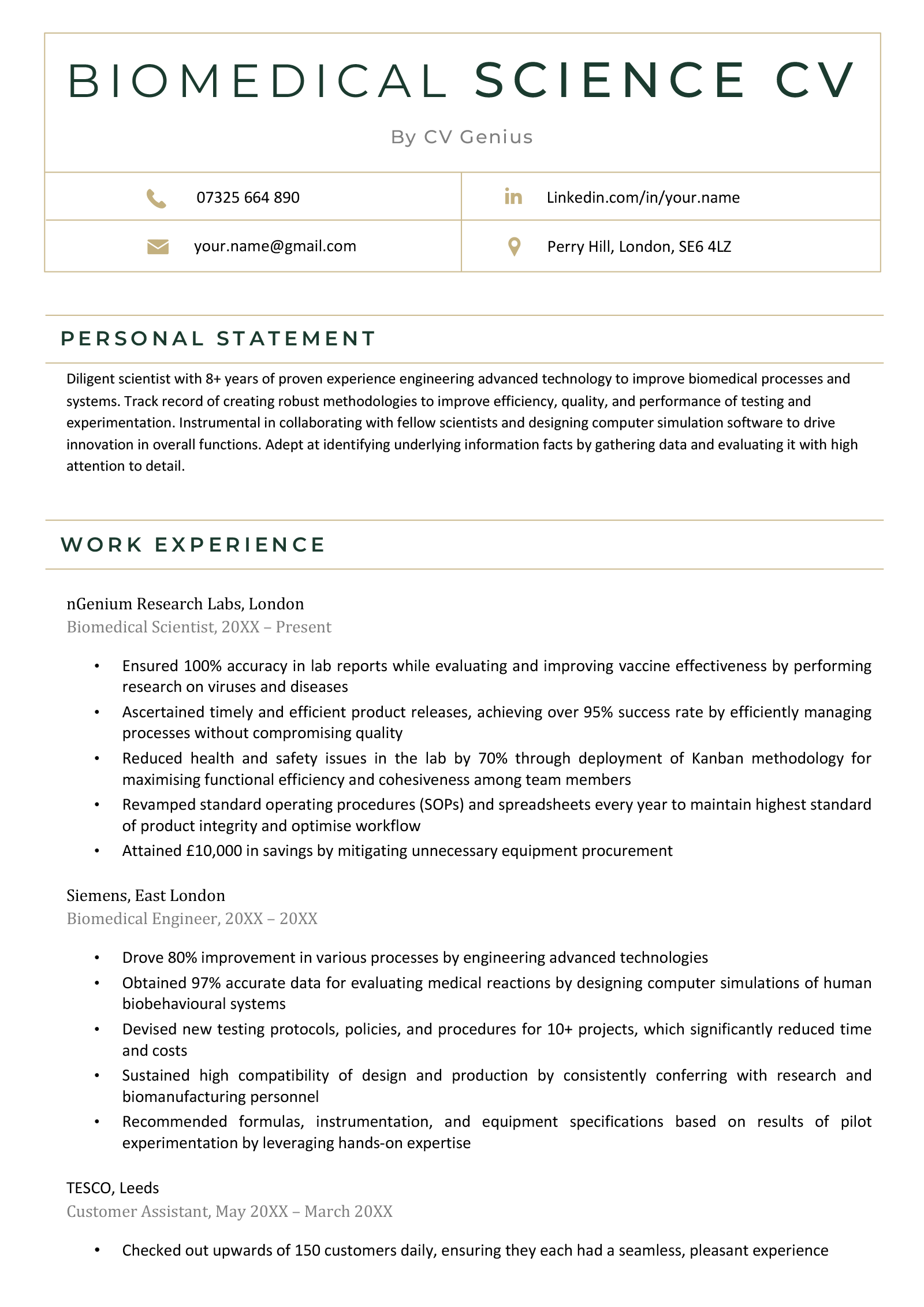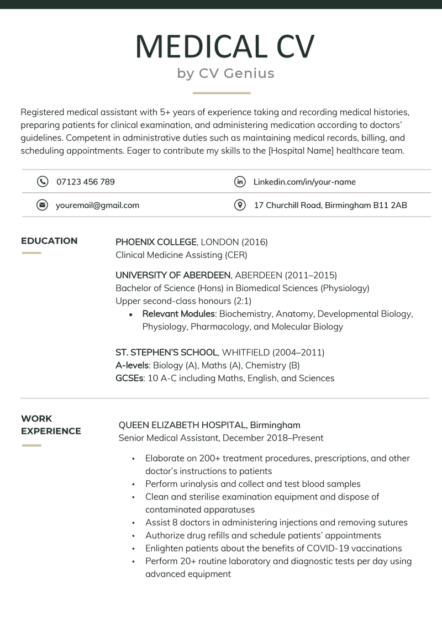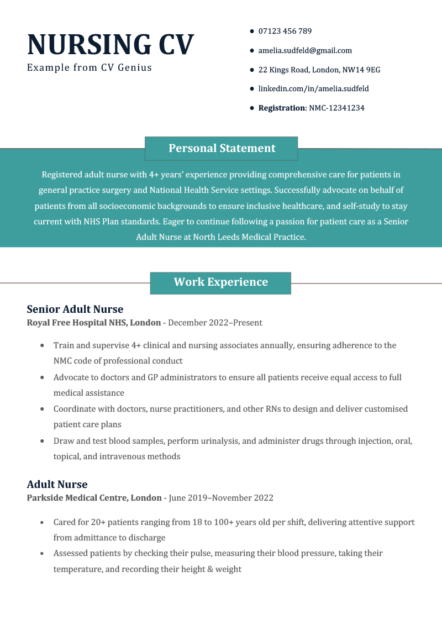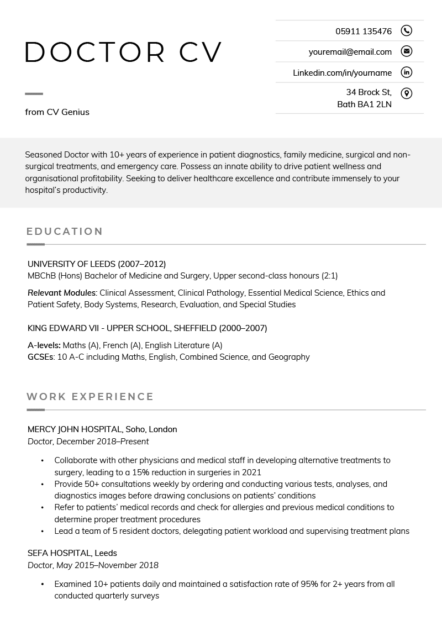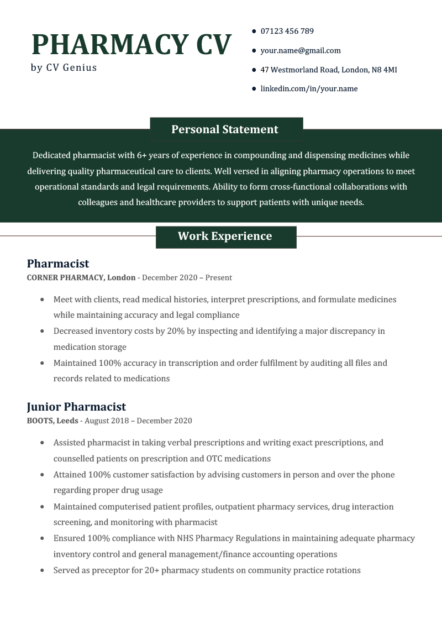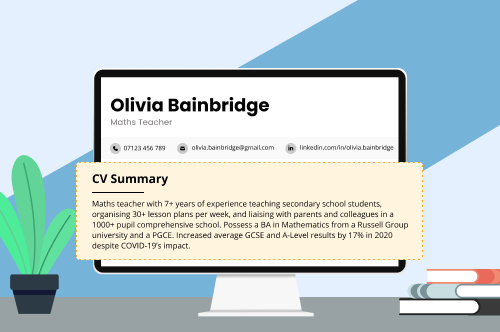Ensure your CV layout is structured to best highlight your unique experience and life situation.
Biomedical Science CV Template (Text Format)
PERSONAL STATEMENT
Diligent scientist with 8+ years of proven experience engineering advanced technology to improve biomedical processes and systems. Track record of creating robust methodologies to improve efficiency, quality, and performance of testing and experimentation. Instrumental in collaborating with fellow scientists and designing computer simulation software to drive innovation in overall functions. Adept at identifying underlying information facts by gathering data and evaluating it with high attention to detail.
WORK EXPERIENCE
nGenium Research Labs, London
Biomedical Scientist, 2020 – Present
- Ensured 100% accuracy in lab reports while evaluating and improving vaccine effectiveness by performing research on viruses and diseases
- Ascertained timely and efficient product releases, achieving over 95% success rate by efficiently managing processes without compromising quality
- Reduced health and safety issues in the lab by 70% through deployment of Kanban methodology for maximising functional efficiency and cohesiveness among team members
- Revamped standard operating procedures (SOPs) and spreadsheets every year to maintain highest standard of product integrity and optimise workflow
- Attained £10,000 in savings by mitigating unnecessary equipment procurement
Siemens, East Londo
Biomedical Engineer, 2018 – 2020
- Drove 80% improvement in various processes by engineering advanced technologies
- Obtained 97% accurate data for evaluating medical reactions by designing computer simulations of human biobehavioural systems
- Devised new testing protocols, policies, and procedures for 10+ projects, which significantly reduced time and costs
- Sustained high compatibility of design and production by consistently conferring with research and biomanufacturing personnel
- Recommended formulas, instrumentation, and equipment specifications based on results of pilot experimentation by leveraging hands-on expertise
Chelmsford Research Lab, London
Assistant Biomedical Scientist, 2016 – 2018
- Contributed to execution of large cross-functional team projects to ensure on-time completion
- Formulated detailed laboratory reports and maintained accurate records of overall methods, research, data sets, and statistical calculations
- Performed client assessment before initiation of the research process
- Created robust methodologies for transferring biological processes from laboratory to commercial-scale manufacturing production
EDUCATION
Queen Mary University | London
Master’s in Biomedical Engineering
Merit
University of Oxford | London
Bachelor’s in Biomedical Science
Upper Second-Class Honours
KEY SKILLS
- Standards compliance
- Information & data analysis
- Experimental design & optimization
- Research & development
- IBM Rational RequisitePro
- ADInstruments LabChart
- Electromyography analysis software
- Virtual instrument software
HOBBIES & INTERESTS
- Camping
- Meditation
- Swimming
- Travelling
- Photography
14+ Skills for your biomedical science CV
Before you begin writing, make sure you know how to write a CV in a way that best emphasises your strengths.
A biomedical scientist typically does research on diseases and how they’re best treated or prevented. They might study bacteria, viruses, or other organisms to learn about how they cause disease, or they may work on improving diagnostic techniques.
Many biomedical scientists work in laboratories, researching the biology of cells, tissues, and organs. Others work in the field, studying animals to see how diseases develop and spread. And some biomedical scientists even work in the computer industry, designing software that helps doctors diagnose illnesses and choose effective treatments.
As a professional scientist or recent graduate looking for a new job, you’ll need to highlight both hard skills (abilities acquired through training) and soft skills (qualities tied to your personality) on your biomedical science CV. Include these skills on your curriculum vitæ to make a good first impression on employers:
- Medical equipment operation
- Biomedical computation
- Data analysis
- Problem solving
- Written and oral communication
- Biochemistry validation
- Attention to detail
- Biomedical diagnostic testing
- Research
- Collaboration
- Organisation
- Record keeping
- Knowledge of health and safety regulations
- Specialist knowledge (haematology, histology, transfusion, etc.)
Make more time for your job hunt by automating the CV writing process — a good CV builder can create your application document for you in a matter of minutes! And you’re going to need a biomedical science cover letter too, so use a cover letter builder to create one.
